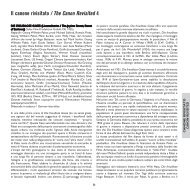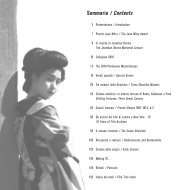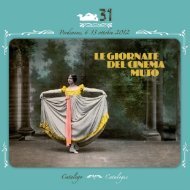Le Giornate del Cinema Muto 2006 Sommario / Contents
Le Giornate del Cinema Muto 2006 Sommario / Contents
Le Giornate del Cinema Muto 2006 Sommario / Contents
Create successful ePaper yourself
Turn your PDF publications into a flip-book with our unique Google optimized e-Paper software.
A hungry tramp tries to steal money from a newsboy, but changes his<br />
mind. He considers suicide, but the newsboy gives him money to eat.They<br />
both sleep in the street.The tramp begins to work at odd jobs; then he<br />
gets hired as a <strong>del</strong>ivery man. He meets a washerwoman.The tramp and<br />
the boy rent an apartment.The tramp saves the life of a rich man’s little<br />
daughter when she falls out of a window. He is rewarded for his pains,<br />
and can set up house with the washerwoman.<br />
Marguerite Engberg writes of this film: “In terms of both form and<br />
content, it is inferior to the films offered by foreign companies, so it was<br />
not hard to understand why Ole Olsen wanted a new artistic director.”<br />
Viggo Larsen had directed nearly all the fiction films made by Nordisk<br />
until this point, but he soon left for a successful career as an actor-director<br />
in Germany. – CASPER TYBJERG<br />
EKSPEDITRICEN [La commessa / The Shopgirl] (In the Prime of<br />
Life) (Nordisk Films Kompagni, DK 1911)<br />
Regia/dir: August Blom; scen: Lau Lauritzen Sr.; f./ph: Axel Graatkjær;<br />
cast: Thorkild Roose (il ministro/the minister), Ella la Cour (sua<br />
moglie/his wife), Carlo Wieth (il figlio/his son Edgar), Clara Wieth (Ebba<br />
[Ellen]), Zanny Petersen (Lily), Lauritz Olsen (dottore/doctor); première:<br />
12.8.1911; 35mm, 934 m., 45’ (16 fps), Danish Film Institute. Copia<br />
<strong>del</strong>/Print from 1957.<br />
Didascalie in danese / Danish intertitles.<br />
Un ricco giovanotto, Edgar, prova un’immediata attrazione per una<br />
commessa, Ellen, e le compra dei fiori. I due si incontrano la domenica<br />
successiva e, presumibilmente, in seguito si vedono spesso. Tre mesi<br />
dopo Ellen è incinta. I due decidono di sposarsi, così Edgar informa la<br />
madre. Il padre lo convince a desistere e lo manda lontano, in<br />
campagna, a far visita a degli amici. La figlia di costoro, Lily, scoperto di<br />
Ellen, spinge Edgar a scriverle. Ma il padre di lui si fa consegnare le<br />
lettere dall’ex datore di lavoro <strong>del</strong>la ragazza. Non ottenendo risposta<br />
da Ellen, Edgar ritorna in segreto in città. Nasce il bambino e, poco<br />
dopo, Ellen muore. Lily arriva dalla campagna e Edgar legge su un<br />
quotidiano l’annuncio <strong>del</strong>la morte di Ellen. Edgar e Lily vanno in<br />
ospedale a prendere il bambino decidendo anche di sposarsi.<br />
(Riassunto tratto da Ron Mottram, The Danish <strong>Cinema</strong> Before Dreyer,<br />
Scarecrow Press, 1988.)<br />
Un esempio eccellente dei primi lungometraggi Nordisk e dei<br />
“drammi sociali” che una <strong>del</strong>le prime sociologhe <strong>del</strong> cinema, Emilie<br />
70<br />
Altenloh, identificò nel 1914 come il contributo peculiare <strong>del</strong> cinema<br />
danese: i film di questo genere mostrano la lotta <strong>del</strong>la donna “divisa<br />
tra i suoi naturali istinti femminili e sensuali e le condizioni sociali in<br />
conflitto con essi” (Zur Soziologie des Kino, p. 58; http://www.unioldenburg.de/kunst/mediengeschichte/allg/altenloh).<br />
Clara Wieth (1833-1975; nata Rasmussen, dal 19056 al 1920 moglie<br />
<strong>del</strong>l’attore Carlo Wieth, quindi sposatasi con il dott. Pontoppidan e<br />
diventata nota professionalmente come Clara Pontoppidan) fornisce<br />
una prestazione assolutamente <strong>del</strong>iziosa nei panni <strong>del</strong>la dolce,<br />
civettuola commessa che finisce male, ed il modo con cui il film si<br />
schiera nettamente dalla sua parte è notevole. La direzione di August<br />
Blom è discreta ma attenta. – CASPER TYBJERG<br />
A wealthy young man, Edgar, sees a shopgirl, Ellen, and is immediately<br />
attracted to her. He buys her flowers. They meet the next Sunday, and,<br />
presumably, often thereafter. Three months later Ellen is pregnant. The<br />
couple decide to marry, and Edgar tells his mother. His father convinces<br />
him not to marry Ellen and sends him away to visit friends in the country.<br />
The daughter of the family he visits, Lily, gets him to write to Ellen when<br />
she finds out about her. Edgar’s father, however, has convinced Ellen’s<br />
former employer, to whom the letters have been sent, to turn them over<br />
to him. When Edgar gets no reply from Ellen, he secretly returns to the<br />
city. The baby is born and Ellen dies shortly after. Lily visits from the<br />
country, and Edgar sees a notice of Ellen’s death in the newspaper. Edgar<br />
and Lily go to the hospital to claim the baby, planning also to marry. (Plot<br />
summary from Ron Mottram, The Danish <strong>Cinema</strong> Before Dreyer,<br />
Scarecrow Press, 1988)<br />
An excellent example of Nordisk’s early feature production, and of the<br />
“social drama” genre that pioneering film sociologist Emilie Altenloh in<br />
1914 identified as the distinctive contribution of Danish cinema, showing<br />
“a woman’s struggle between her natural, feminine-sensual instincts and<br />
social conditions conflicting with them” (Zur Soziologie des Kino, p. 58;<br />
http://www.uni-oldenburg.de/kunst/mediengeschichte/allg/altenloh).<br />
Clara Wieth (1883-1975; née Rasmussen; married to actor Carlo Wieth<br />
[1885-1943] from 1906 to 1920, then to Dr. Poul Pontoppidan, after<br />
which she became known professionally as Clara Pontoppidan) was one<br />
of the finest actresses of Danish silent film. Here she gives an absolutely<br />
<strong>del</strong>ightful performance as the sweet, flirtatious shopgirl who comes to<br />
grief, and the way the film’s sympathy is very clearly on her side is quite<br />
remarkable. August Blom’s staging is unobtrusive but carefully done.<br />
CASPER TYBJERG

















